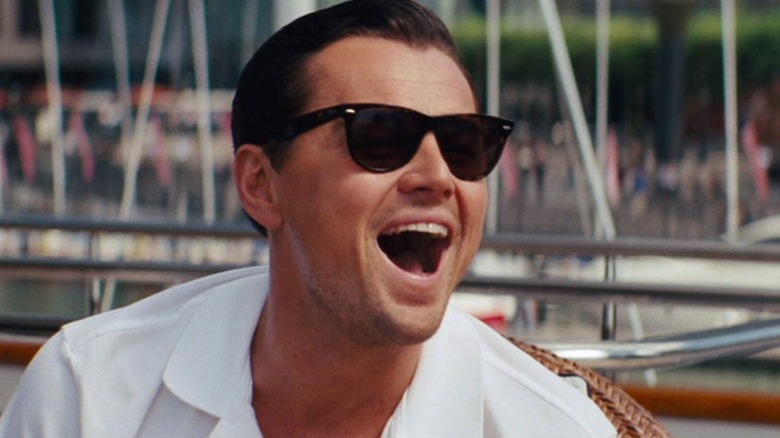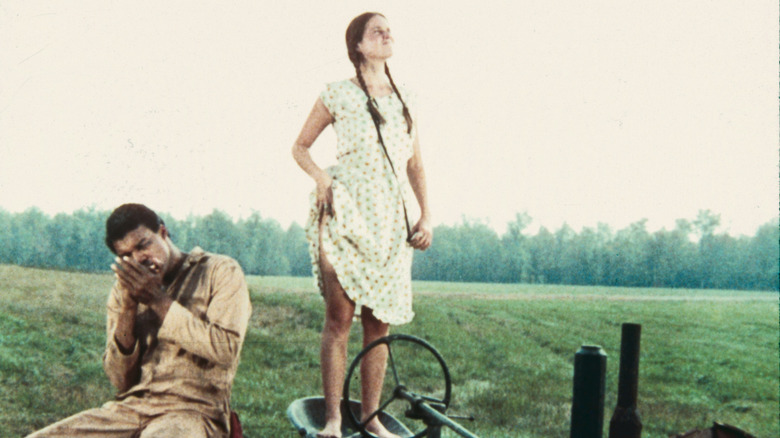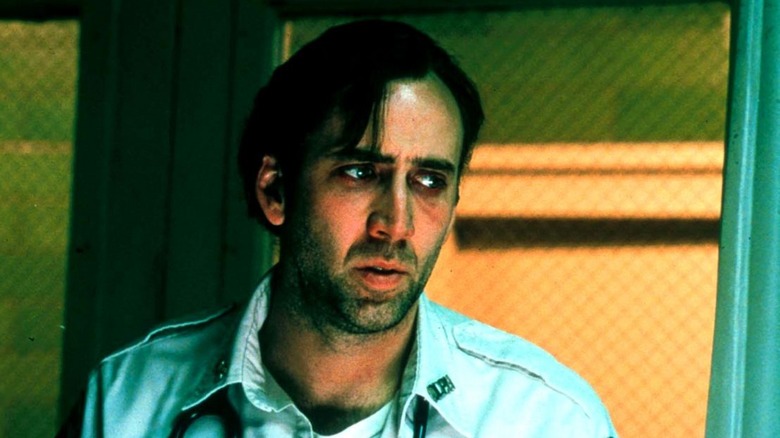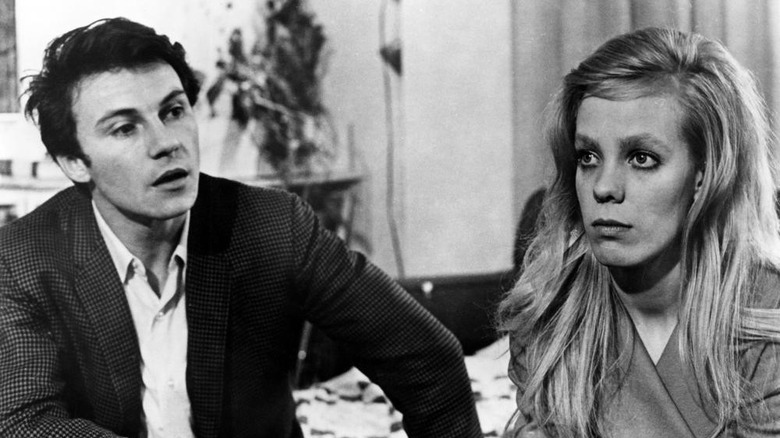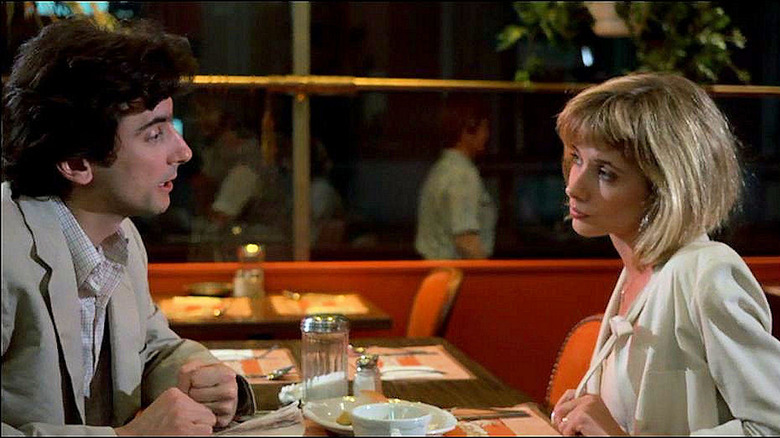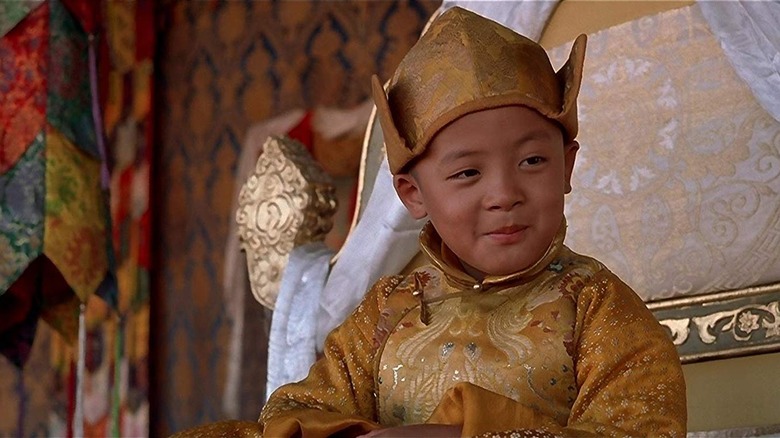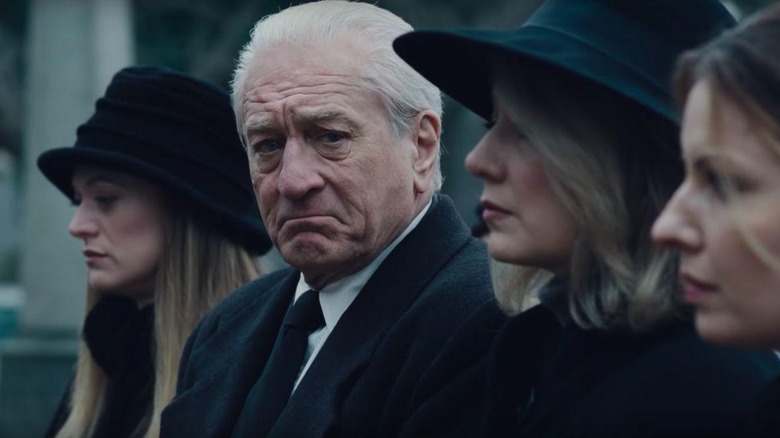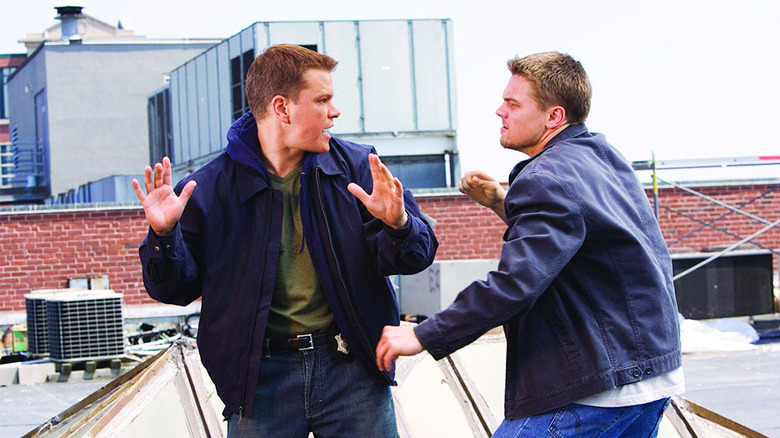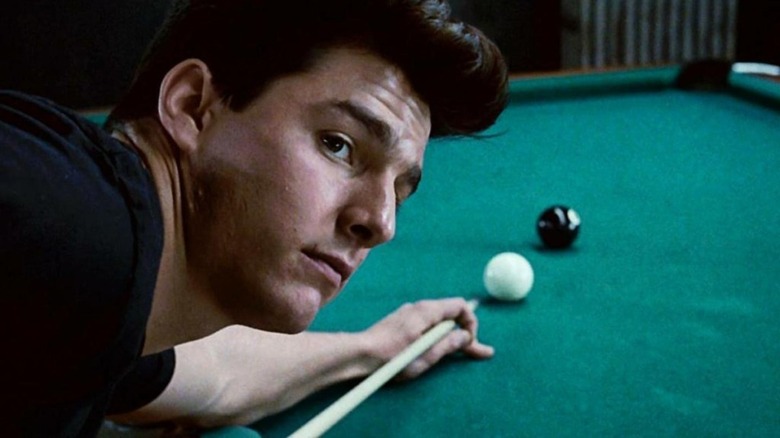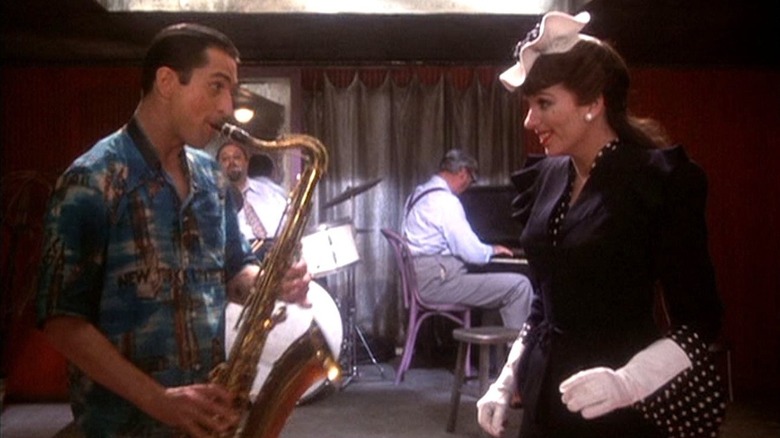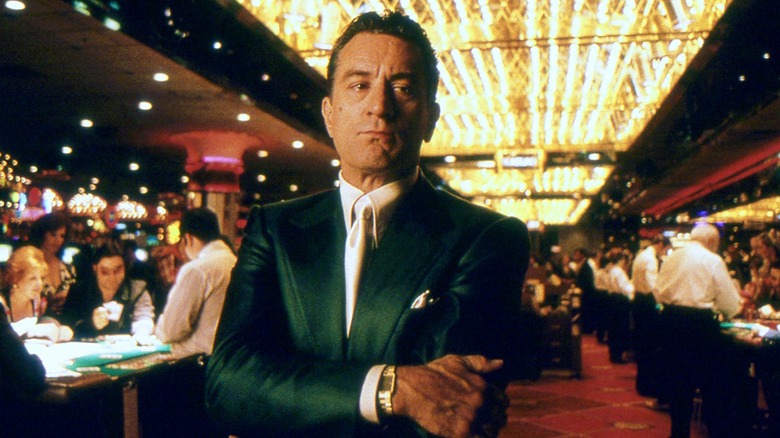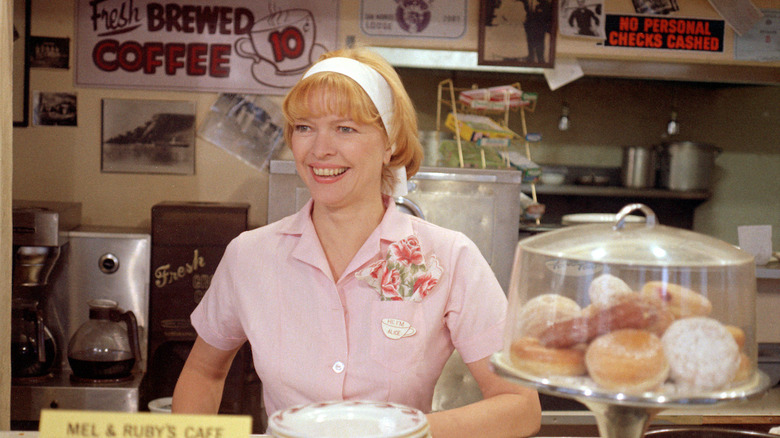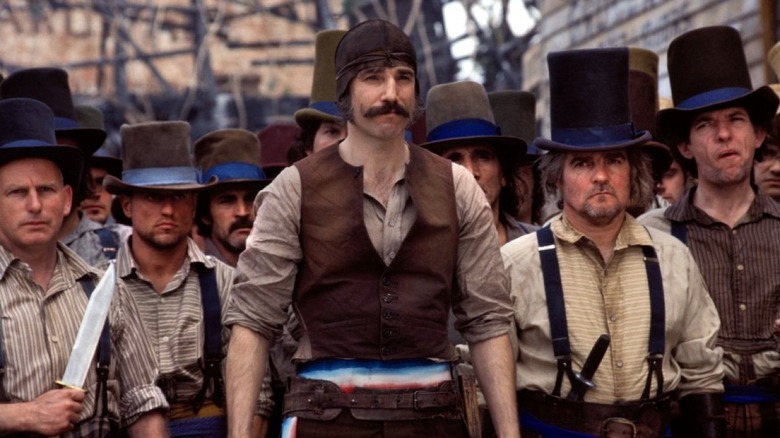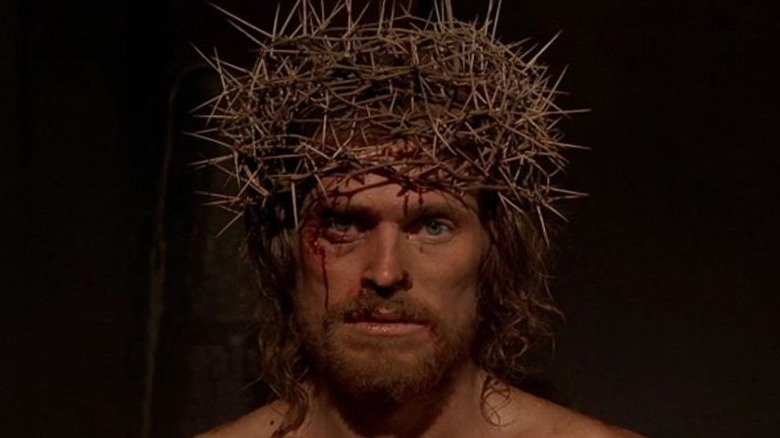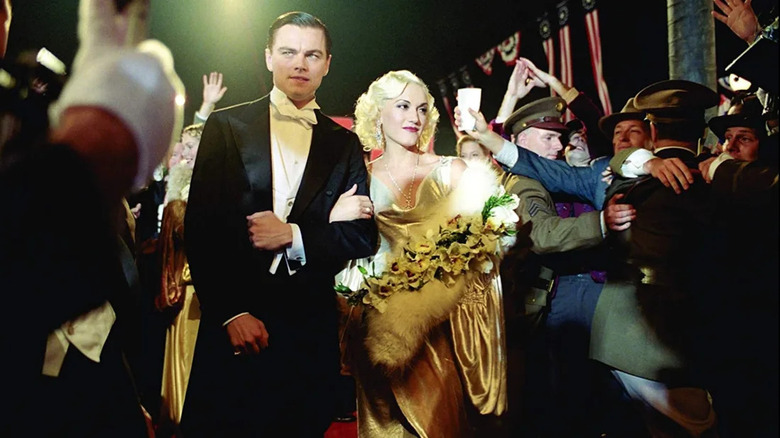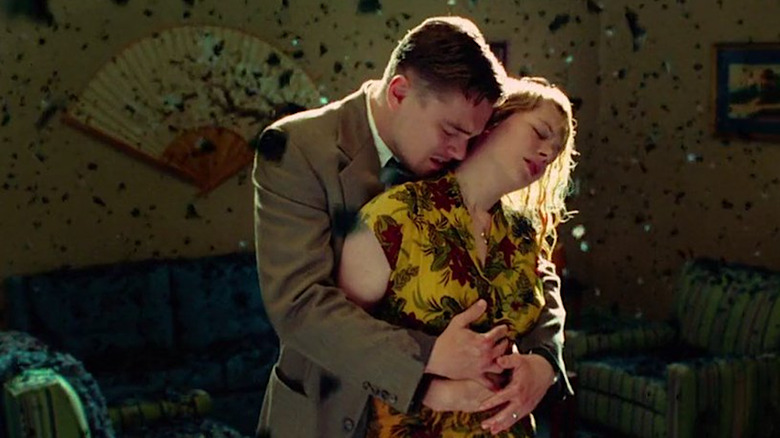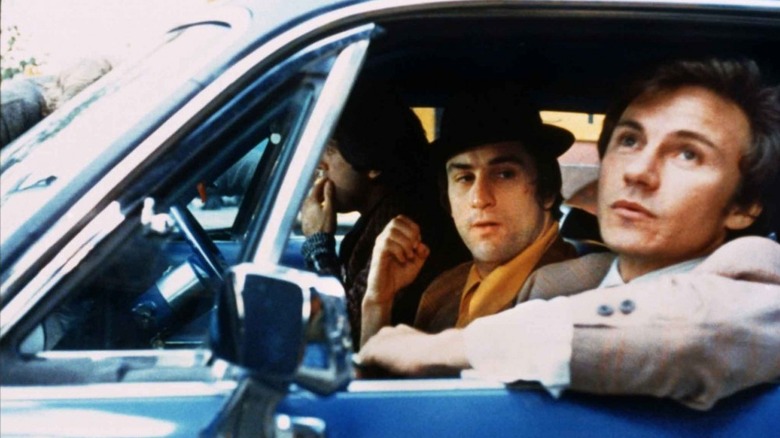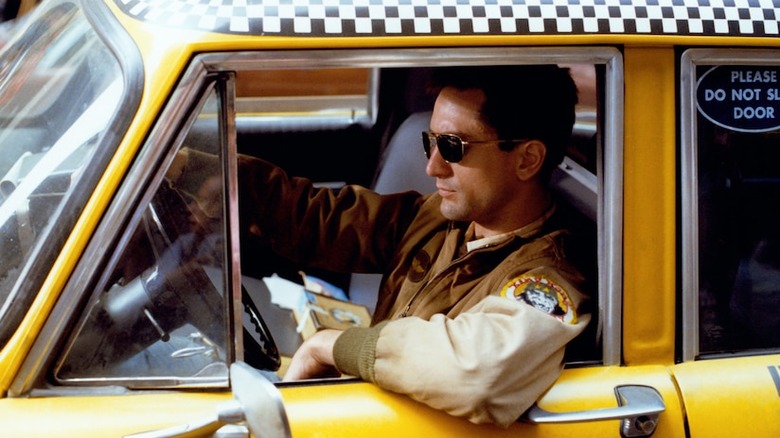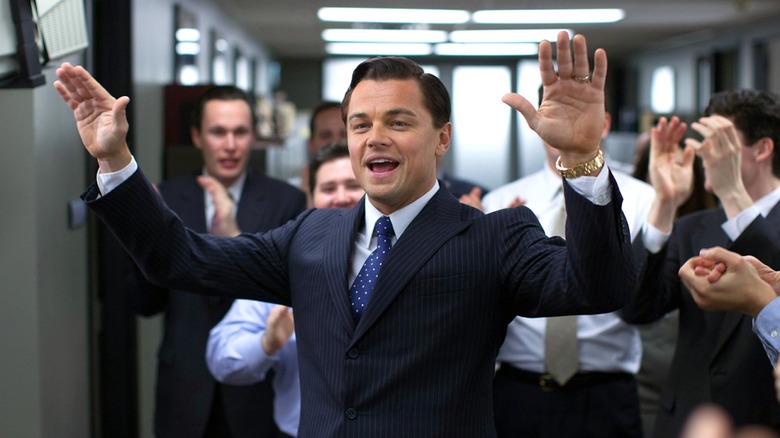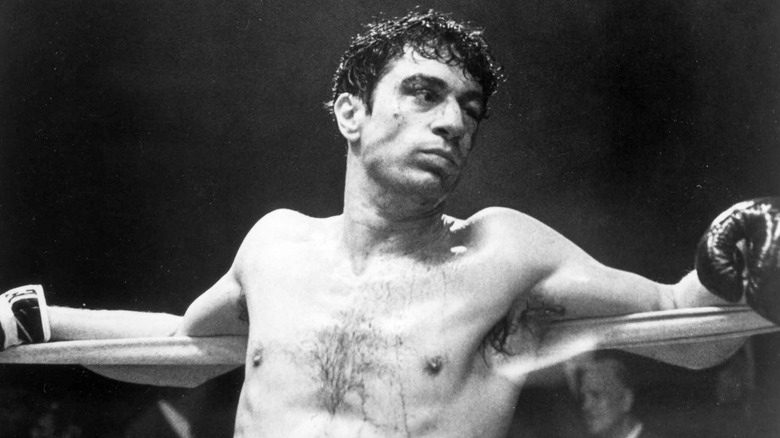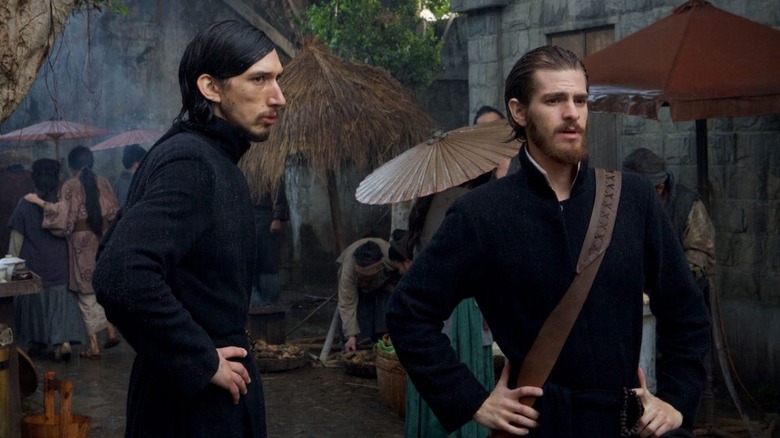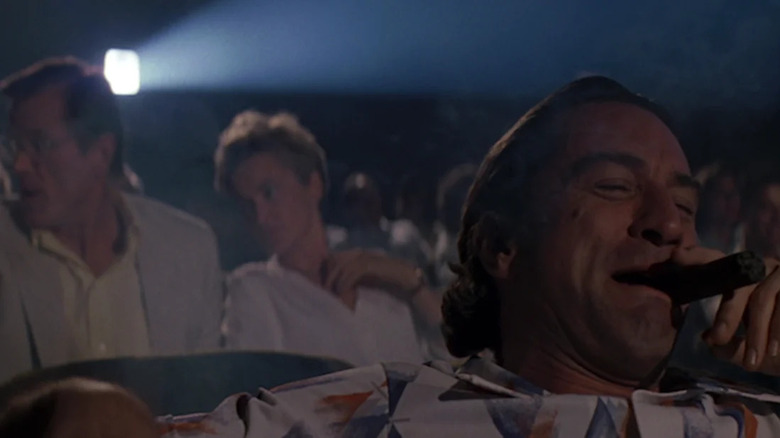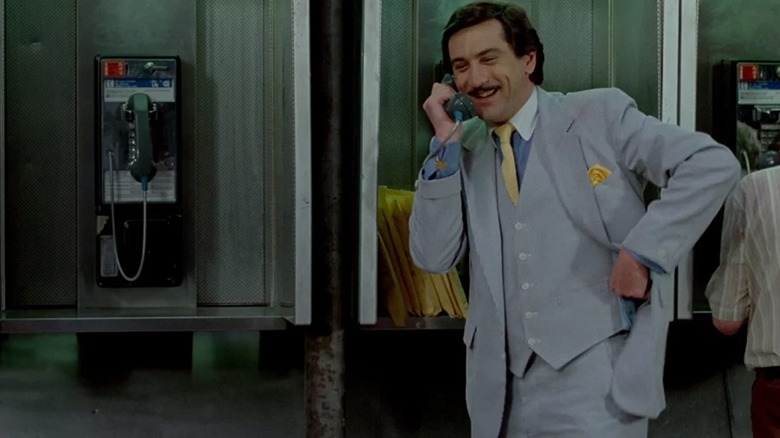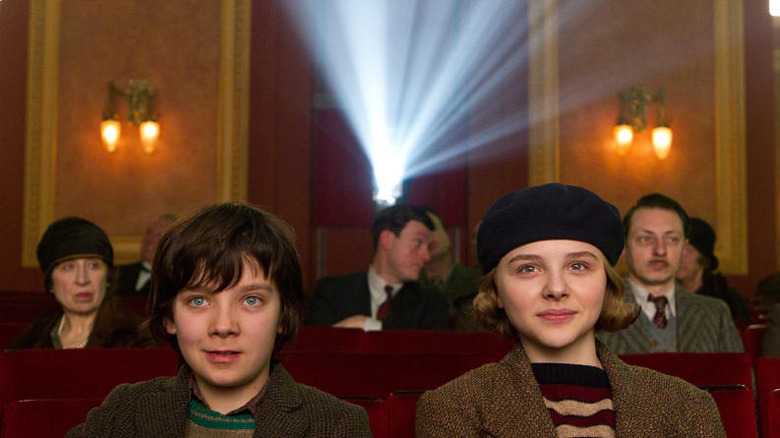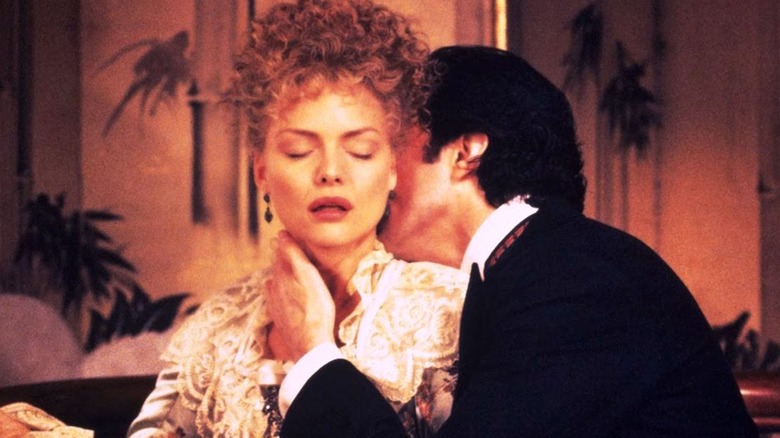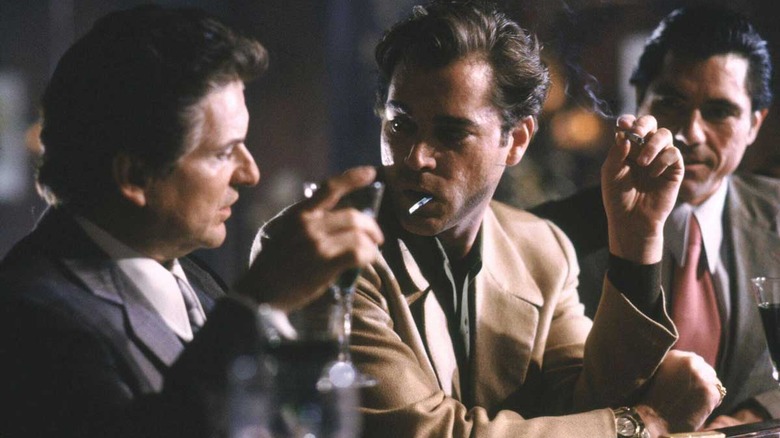Every Martin Scorsese Feature Ranked From Worst To Best
How do you even begin to break down Martin Scorsese's staggeringly consistent filmography, let alone try to rank his movies in order of quality? One of the most talented directors in American cinematic history, there's not a whole lot of daylight between his best and worst films. Even the box office bombs that couldn't connect with an audience have enough redeeming qualities to make them worthwhile. Scorsese's films are never bad, in part because he has such a reverence for cinema; each of his movies is steeped in Hollywood history, with hidden depths and allusions to things that came before.
Despite the fact that Scorsese is a living legend in the film industry, he hasn't gotten the accolades that he arguably deserves. Several of his films have received Academy Awards, but in his long and storied career, he's only won Best Director once. You wonder if this is because his work continually defies expectations. He's best known for gangster films, but he's also never passed up the opportunity to challenge himself with a totally different genre whenever he found a story he was passionate about.
25. Boxcar Bertha
There had to be one at the bottom, and "Boxcar Bertha" seems like an obvious choice. After garnering attention for his short films and independent directorial debut a few years earlier, "Boxcar Bertha" would serve as Martin Scorsese's first Hollywood feature. Scorsese tackles the loosely autobiographical story of a female outlaw played by Barbara Hershey, who is on the run with union organizer "Big" Bill Shelly (David Carradine) after a series of train robberies.
There's nothing particularly wrong with "Boxcar Bertha," but it's clear that Scorsese isn't in his element quite yet. Although his exploration of American criminality tackles themes that would be essential to his later work, he leans a bit too heavily on other crime films for inspiration. And released just a few short years after "Bonnie and Clyde," it suffers by comparison. "Boxcar Bertha" was not especially well-received by audiences or critics, and to this day it remains one of Scorsese's least-remembered films.
24. Bringing Out the Dead
If you had to list all of Martin Scorsese's films, "Bringing Out the Dead" is the one that everyone except the diehard fans would have trouble remembering. Which is a shame, because it has a pretty decent pedigree. Marty collaborates with screenwriter Paul Schrader for the fourth time (their previous efforts were "Taxi Driver," "Raging Bull," and "The Last Temptation of Christ" so, you know, not too shabby), and in front of the camera he has Nicolas Cage, Patricia Arquette, John Goodman, and Ving Rhames. All signs point to promising.
But for whatever reason, this story about late-night paramedics and their many interactions with the drug addict community failed to connect with audiences. It ended up making only half of its budget back, a rarity for a Scorsese film. And although critics were generally appreciative of its merits, "Bringing Out the Dead" wasn't able to make the sort of cultural impact that has defined many of the lauded director's more successful films.
23. Who's That Knocking At My Door
There's always a certain fascination that accompanies the debut film from a director as illustrious as Martin Scorsese. "Who's That Knocking at My Door" is a bit rough around the edges, but even in his first film, the themes that most interested Scorsese are evident. It stars Harvey Keitel (an actor whom Scorsese would return to again and again over the course of his career) as a Catholic Italian-American who struggles to cope when he learns that his girlfriend was raped by a former boyfriend.
He is torn between his feelings for her, and a lifetime of religious indoctrination that has taught him to regard such a woman as spoiled. He acts badly out of anger, shame, and fear, and his inability to overcome the influence of his Catholic teachings sabotages their relationship. "Who's That Knocking at My Door" is an ultra low-budget affair, but even without the benefits of a large budget or established stars, Scorsese's talent was clear.
22. After Hours
Say what you will about Martin Scorsese, but his films can rarely be described as "light." That's why "After Hours" stands out in his filmography, and also why it fails to stack up against some of his work with more gravitas. It's a simple story with a dark sense of humor: a man (played by Griffin Dunne) attempts to make his way home from a night on the town, only to be repeatedly prevented from doing so thanks to a series of comic misadventures.
Scorsese so often makes films with narratives that he feels a powerful emotional connection to, so it's refreshing that for once he was able to let his hair down a little bit and have fun. And it deserves credit for reminding audiences something that they often forget: Martin Scorsese films can be legitimately funny. But because it is fairly light-weight in terms of story, "After Hours" tends to fly under the radar, not leaving much of a long-term impression on audiences.
21. Kundun
A continual theme of Martin Scorsese's work is that you should never be too sure that you know what he's going to do next. The story of the Dalai Lama may not have been an obvious choice, but that's likely what drew him to "Kundun" in the first place. It was certainly a step out of his comfort zone. Scorsese has never been a stranger to a sprawling epic, but this went well beyond even his scope, spanning twenty years in early 20th century Tibetan history as it tracks the life of the 14th Dalai Lama from the time he was two years old into adulthood.
As you might expect, "Kundun" did not do particularly well at the box office. The character of the Dalai Lama is one that is inaccessible to many viewers, for the simple fact that he comes across as a spiritual entity rather than a flesh-and-blood human being. It is gorgeously made, but suffers from a lack of the human element that grounds so many of Scorsese's other films.
20. The Irishman
When a director reaches their seventies, it's almost inevitable that their output starts to lean towards the concept of legacy, as we see in "The Irishman." For this magnum opus, Scorsese assembled a dream team of Italian-American actors known for their performances in gangster films: Robert De Niro, Al Pacino, and Joe Pesci. We are treated to the ascendency of truck-driver-turned-hit-man Frank Sheeran (De Niro) and his life in organized crime, shown from the perspective of an elderly Frank looking back on his life.
There are elements of "The Irishman" that work well — the dynamic between De Niro and Al Pacino's Jimmy Hoffa is especially compelling. But there's one fatal flaw in the film: the bad de-aging technology. It's incredibly distracting, and it's a shame that they didn't just hire younger actors for earlier moments in the timeline, especially when you remember that De Niro himself rose to prominence (and won an Oscar for) his performance as the younger version of a character originated by the iconic Marlon Brando.
19. The Departed
At long last, Martin Scorsese receives his first Best Director Academy Award. The only problem? It definitely falls into the category of the make-up Oscar, where a director ends up getting a win for a film that doesn't really deserve it, because there's a perception that they were slighted for an earlier, superior film and are now "overdue." That's "The Departed" to a tee.
To be fair, there's nothing really wrong with it. "The Departed" is a perfectly serviceable adaptation of the Hong Kong action thriller "Infernal Affairs" that sees a Boston cop (Leonardo DiCaprio) go undercover in the mob, while a young gangster (Matt Damon) operates as a mole within the police department. Their allegiances are questioned, and they're always an inch away from being found out. DiCaprio and Damon are great in it, and the only shame is that they don't get enough opportunities to play off one another. Really, it's only getting bumped down a few spots because of the over-the-top visual metaphor of the rat at the end of the film. Come on, now.
18. The Color of Money
Martin Scorsese revisits certain themes in his work over and over again throughout the years, but for the most part he stays away from sequels. He tells the movie that he wants to tell, he makes it however long he wants it to be because no one's going to tell Scorsese to bust out the editing scissors, and then he moves on. In fact, "The Color of Money" is the only real sequel he's made in his entire career, and even that is a sequel to someone else's work.
It stars Paul Newman, picking up his pool-playing role of "Fast Eddie" Felson from "The Hustler" as he takes a young hustler, Vincent Lauria (Tom Cruise), under his wing, teaching him the tricks of the trade. The only problem is that Vincent's way too cocky: the linchpin in any hustling scheme is that at the beginning, you have to lull your mark into a false sense of security by playing badly on purpose, and he just can't bring himself to do that. But while Cruise is the up-and-coming star of the film, it's Paul Newman who proves himself to be just as charming as ever, winning his first ever Academy Award for "The Color of Money."
17. New York, New York
Whenever you think you know what to expect from Scorsese, he goes in an unexpected direction. He'd made a name for himself directing hard-hitting, violent New York City dramas, but why not tackle a period musical? "New York, New York" stars Robert De Niro and Liza Minnelli as an extremely dysfunctional couple who meet after World War II and embark on a musical career together. To be honest, it's kind of a frustrating film. Neither of the lead characters are likable enough to sustain the bloated run time of "New York, New York," and it begins to feel a little aimless after the first two hours.
But it has one redeeming factor which is enough, it would seem, to forgive many of its sins: the note-perfect title song. When Liza Minnelli begins her show-stopping performance of "New York, New York," it creates such a mesmerizing atmosphere that for a brief shining moment, you can't tear your eyes away.
16. Casino
Another day, another Martin Scorsese crime drama starring Robert De Niro and Joe Pesci. This is "Casino," a perfectly serviceable film that won plenty of accolades (including a Best Actress nomination at the Academy Awards for Sharon Stone), but it's hard to avoid feeling like this is Scorsese on autopilot. De Niro plays a Jewish gambling expert who is asked to run the day-to-day operations of a casino in Las Vegas — a job that, in addition to the inherent occupational difficulties he faces on a regular basis, brings him into close contact with the mafia, who are heavily involved in the casino industry.
It is genuinely well-made, so much so that if it had been released before "Goodfellas," there's every possibility that it would be the one that received all the credit and addition. But coming out several years later, it isn't able to capture a sense of freshness and creativity that would combat its somewhat repetitive nature.
15. Alice Doesn't Live Here Anymore
One of the most fascinating aspects of Scorsese's filmmaking career is that no matter how closely he is identified with the gangster genre, from the very beginning of his career he showed an interest in telling other kinds of stories. "Alice Doesn't Live Here Anymore" captured a different perspective on American life, one that is softer than his New York City-based films. It starred Ellen Burstyn as a recently widowed mother who packs up all of her possessions and moves to California, hoping to pursue a singing career that she dreamed of before she was married.
Gentle but with an often hilariously wry sense of humor, "Alice Doesn't Live Here Anymore" was the first massive hit of Scorsese's career, and the first to garner awards attention. It was nominated for three Academy Awards, and Ellen Burstyn took home Oscar gold for Best Actress.
14. Gangs of New York
In a lot of ways, "Gangs of New York" represents Scorsese entering a new era in terms of his collaborations. Up until this point, we had a sense of the actors he would lean on the most for key roles in many of his films: Robert De Niro, Harvey Keitel, Joe Pesci, the familiar faces of the crime genre. But with "Gangs of New York," a period drama set in the violent, lawless Five Points neighborhood of New York City in the late 1800s, he first works with the actor who would define the past two decades of his career: Leonardo DiCaprio. (Interestingly enough, it was reportedly De Niro himself who first mentioned DiCaprio to Scorsese, after he worked with the then 19-year-old actor in "This Boy's Life.")
You can see the potential of the collaboration between the two immediately, although "Gangs of New York" is not without its flaws. It has an unfocused third act, when the Civil War draft riots, and Cameron Diaz makes for an unconvincing female lead. Still, with commanding performances from Daniel Day Lewis and Leonardo DiCaprio, it's difficult to complain too much about the end result.
13. The Last Temptation of Christ
On the one hand, Martin Scorsese's work has frequently grappled with a complicated relationship with Catholicism, so it makes sense that sooner or later he would be tempted to do a Jesus film. But at the same time, "The Last Temptation of Christ" is so bold and shocking that it feels like nothing he's ever done before. It stars Willem Dafoe as a grounded, very human version of Jesus during his last days on earth, capturing the audience's emotions in ways that stand in complete opposition to the more epic, impersonal religious blockbusters of previous decades.
"The Last Temptation of Christ" was incredibly controversial, especially amongst religious groups, for its depiction of Jesus Christ as having had an intimate relationship with Mary Magdalene, and indulging in lustful fantasies. But despite its unconventional approach to the gospels and its underwhelming box office returns, it stands out as one of Scorsese's most abstract and allegorical films, and was responsible for earning him his second Oscar nomination for Best Director.
12. The Aviator
There was a moment in the early 2000s when Leonardo DiCaprio, desperate to shed his teen heartthrob image and be taken seriously as an actor, began to work with every prestige director who would have him. "The Aviator" represents his second collaboration with Martin Scorsese in just over two years, the beginning of a working relationship still going strong to this day. Here he plays the famously eccentric Howard Hughes, from his early, promising days as a Hollywood producer to his descent into mental illness that would define his legacy.
"The Aviator" is entirely Leonardo DiCaprio's baby, and he makes a meal out of the showier elements of his performance. But while DiCaprio is good in the lead role, the most fun moments come from the frequent classic Hollywood celebrity cameos that give Scorsese an opportunity to embrace his inner film nerd. Cate Blanchett in particular does a startlingly good imitation of Katharine Hepburn, a role that would win her an Academy Award for Best Supporting Actress.
11. Shutter Island
Martin Scorsese definitely experiments in different genres whenever the spirit moves him, but most of his films tend to be grounded in reality in a way that "Shutter Island" purposefully defies. Leonardo DiCaprio plays a US Marshall investigating a psychiatric institution on a remote island in New England (it feels as though Stephen King should have been involved), only for events to unfold in such a way as to make him question not just the actions of the hospital, but his perception of reality itself.
Scorsese gleefully throws himself into all of the film's twists and turns, going as abstract and laden with metaphor as he can as it careens towards its shocking ending. Borrowing noir elements and applying them to the sort of psychological thriller we normally see from M. Night Shyamalan, "Shutter Island" isn't for everyone, but it's a dense, perplexing film that benefits from multiple viewings and critical analysis.
10. Mean Streets
You know when you see an actor and director work together for the first time and you can just tell that they're a perfect fit? That's Robert De Niro and Martin Scorsese in "Mean Streets." De Niro has so far starred in nine of Scorsese's films over the years, and this is where their collaboration began. "Mean Streets" is one of his most autobiographical movies, loosely based on his own experiences growing up in Little Italy. (Scorsese and De Niro knew each other as teenagers, living just a few blocks apart from one another in Greenwich Village.)
After the less-than-enthusiastic response to "Boxcar Bertha," a film that Scorsese had essentially been assigned to, "Mean Streets" represented an opportunity for him to tell a story that meant something to him. His personal approach connected with audiences, and "Mean Streets" had a massive impact, influencing the gangster genre for decades to come.
9. Taxi Driver
There are film scenes more frequently quoted than Robert De Niro standing in front of a mirror saying, "You talkin' to me?" in "Taxi Driver," but there definitely aren't many. The story of an alienated Vietnam veteran who befriends a child prostitute (played by a preternaturally mature Jodie Foster), "Taxi Driver" has a gritty naturalism that would make it one of the defining films of the 1970s.
The moody, atmospheric vision of a lonely New York City at night, combined with De Niro's brooding performance as Travis Bickle as he tries and fails to curb his violent impulses, makes "Taxi Driver" one of the most significant contributions to the burgeoning anti-hero cinematic movement of the period. Unfortunately, one of the lasting impacts of the film is its role as an icon for a particularly tiresome subculture of anti-social, alt-right men. But can a movie be held responsible for people misinterpreting it decades down the line? That doesn't seem quite fair.
8. The Wolf of Wall Street
Based on the true story of Jordan Belfort, stock market expert turned white collar criminal turned motivational speaker, "The Wolf of Wall Street" is a heady, seductive fable about not just the corrupting influence of power, but the tendency for figures to seek power who are amoral to begin with. Leonardo DiCaprio is larger than life as Belfort, as he rises through the ranks and clings to his money and prestige even as it becomes clear there's no way for him to escape arrest.
There's very little going on beneath the surface of "The Wolf of Wall Street," but that seems intentional: the shallowness of Jordan Belfort and his colleagues is the point. If nothing else, the film deserves credit for two main things. It introduces us to the luminous Margot Robbie, who plays Belfort's second wife. And it gives the world the sequence where Belfort is on an astonishing amount of quaaludes, in what is possibly one of the funniest scenes Scorsese's committed to celluloid.
7. Raging Bull
On the day that toxic masculinity was redefined, we stood in awe and watched. "Raging Bull" captures the turbulent life of Jake LaMotta, a middleweight boxer whose rage and self-destructive behavior would sabotage his career. It stands as a shining example of an actor going to extraordinary lengths to fully embody their character: Robert De Niro plays LaMotta not just when he was in peak fighting shape, but also many years later as an out-of-shape, would-be comedian.
The practical result of this is that De Niro both trained with LaMotta himself so that he could do justice to the boxing scenes and ended up gaining an incredible sixty pounds to play the older, more pathetic version of the character. Such a commitment has a mesmerizing effect, and won De Niro his second Academy Award (his first came six years earlier for his work in "The Godfather Part II.") In many ways, "Raging Bull" is a challenging film; the brutal violence of LaMotta both in and out of the ring is difficult to watch. But as part of Martin Scorsese's on-going exploration of the dark side of masculinity, it is utterly essential.
6. Silence
More than any other film in Martin Scorsese's catalog, no one knows quite what to do with "Silence." It's a ponderous tale of two Portuguese priests who travel to Japan, where Christian missionaries have been outlawed, to track down their lost mentor. If any other director in the entire world had pitched this movie, you know it never would have gotten made, for the sole reason that no studio executive would have the first idea of how to sell it. But it's Martin Scorsese we're talking about, and he has his own set of rules.
"Silence" features gorgeous cinematography, with striking vistas that capture the hostile yet beautiful terrain of Japan, reflecting how very unwelcome the two men are on these shores. Both Andrew Garfield and Adam Driver are surprisingly moving in their roles, showing a sense of faith and loyalty that is as fascinating to watch, whether its pure and incorruptible or crumbling into the sea. Of all of Scorsese's twenty-first century films, "Silence" is perhaps the one most due for a popular reevaluation of its merits.
5. Cape Fear
Although Martin Scorsese has worked on many films that are adapted from previous works (usually novels), "Cape Fear" represents the only instance where he directed a cinematic remake. Based on the 1962 thriller starring Gregory Peck and Robert Mitchum, it tells the story of a lawyer whose family is put in danger after a convicted rapist begins to target him upon his release from prison.
Robert De Niro's performance is over-the-top but nonetheless chilling. His version of Max Cady is predatory with a cagey intelligence and wild, animalistic tendencies. He has spent his prison time brushing up on both the Bible and law books, and is prepared to mete out punishment for perceived injustices inflicted upon him by Nick Nolte's Sam Bowden. The threat of rape lingers over the entire film, lending it an ugliness that Scorsese wields masterfully. It earned Academy Award nominations for both De Niro and a young Juliette Lewis, who plays Sam Bowden's daughter that Cady attempts to seduce in a commanding early performance.
4. The King of Comedy
Robert De Niro normally has an intense charisma to his performances. Even when he's playing the bad guy, there's still a magnetism that draws you to him almost against your will. "The King of Comedy" plays with that quality, by putting him in the role of a thoroughly mediocre comedian. He thinks that he's much more clever, amusing, and charming than he actually is; he allows fantasy conversations to play out that cast him in a powerful light, so much so that it blinds him to reality. Desperate for fame and glory, he kidnaps his celebrity idol, played cannily by Jerry Lewis.
What "The King of Comedy" captures so well is the dark side of the "little guy" mythos, so popular in American culture, and the danger of privileged white men who feel entitled to a certain level of success and prestige just because they want it bad enough. It's a challenging watch — despite its title, there are few laughs contained within "The King of Comedy." Scorsese purposefully withholds that release from the audience so that the film has a greater emotional impact.
3. Hugo
"'Hugo' in the number three slot?" you may say, incredulously. "I'm going to need to tweet at her to tell her that she's wrong about this one."
But listen. "Hugo" deserves a high spot on this list for a number of reasons. First, it is one of the only films in history that was genuinely improved by being filmed in 3D. And secondly, this more than any other film captures Scorsese's deep and abiding love for the cinema.
It's undeniably his most family-friendly movie — the story of an orphaned boy (Asa Butterfield) who lives in a train station and becomes friends with Isabelle (Chloe Grace Moretz), goddaughter of the great silent film director Georges Méliès (Ben Kingsley.) As they discover the wonders of the cinema, they help him to celebrate his groundbreaking innovations without allowing them to be completely overshadowed by bitter lamentations. As an artist himself, Scorsese was likely aware of the impulse to be ruled by your regrets: creative decisions you might have done differently, shots you wish you could have back, and any number of ruminations that keep you living in the past.
2. The Age of Innocence
The vast majority of Martin Scorsese's work is not what you might call romantic. That's why "The Age of Innocence," with all its repressed longing and unrequited love, comes as something of a surprise. Adapted from the 1920 novel of the same name by Edith Wharton, it represents an unexpected foray into a softer, gentler style of filmmaking. He captures the period details perfectly, evoking the ostentatious spirit of Gilded Age glamour, but beyond that, he has the benefit of three powerful performances from Daniel Day Lewis, Michelle Pfeiffer, and Winona Ryder in a slightly imbalanced love triangle.
Scorsese's attentions, normally devoted to the violent aspects of life, are here channeled into more delicate but nonetheless brutal emotional pain. A great director is capable of stepping outside their comfort zone and bringing along with them the qualities that made their genre films so successful. They are not cowed by the fear of failure or making missteps with an unfamiliar cinematic style. With "The Age of Innocence," we receive confirmation once again that Martin Scorsese is a great director.
1. Goodfellas
What is there to say about "Goodfellas" that hasn't already been said? It's the most well-balanced of Scorsese's crime dramas, somehow managing to walk a tightrope line of feeling threatening and intense, but not losing the opportunity for nuanced shades of humor to come through. They blend together magnificently, ebbing and flowing within the same scene and amplifying each other in their contrast, as we see in Joe Pesci's iconic "how am I funny?" scene.
Essentially, "Goodfellas" is the life story of a man who rises up the ranks of the mafia organization he sees around him in working-class Brooklyn. It captures this insular world with a rare authenticity. Beyond that, though, there's a sense of artistry to Scorsese's work. The opening sequence, an unbroken Steadicam tracking shot as Henry (Ray Liotta) takes Karen (Lorraine Bracco) out on a date, is an obvious highlight: an incredibly impressive technical achievement that adds depth to the storyline, using the smooth maneuver to show Henry seducing Karen with his lifestyle. "Goodfellas" isn't just one of Scorsese's best films, it's one of the best films, period.
